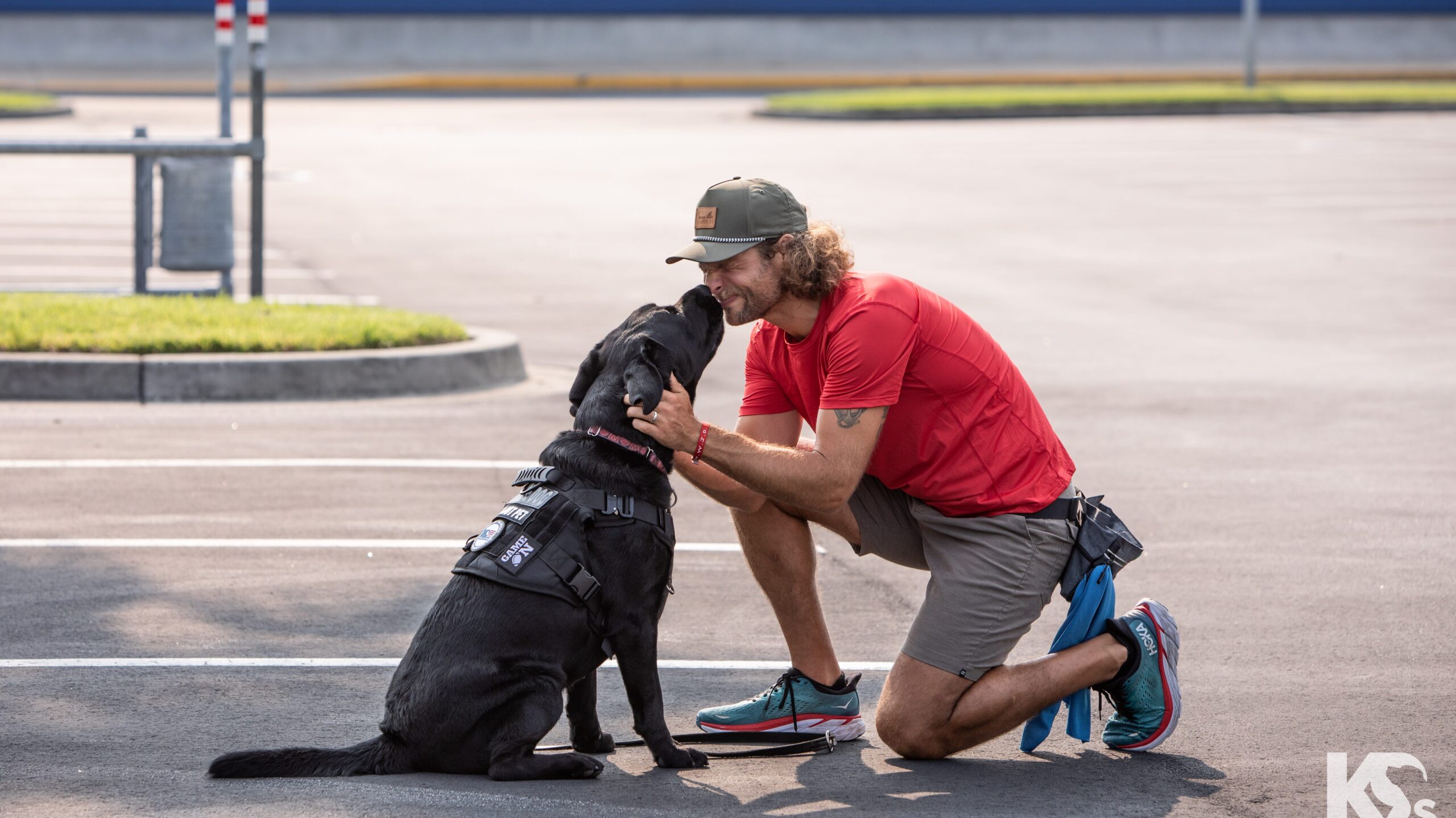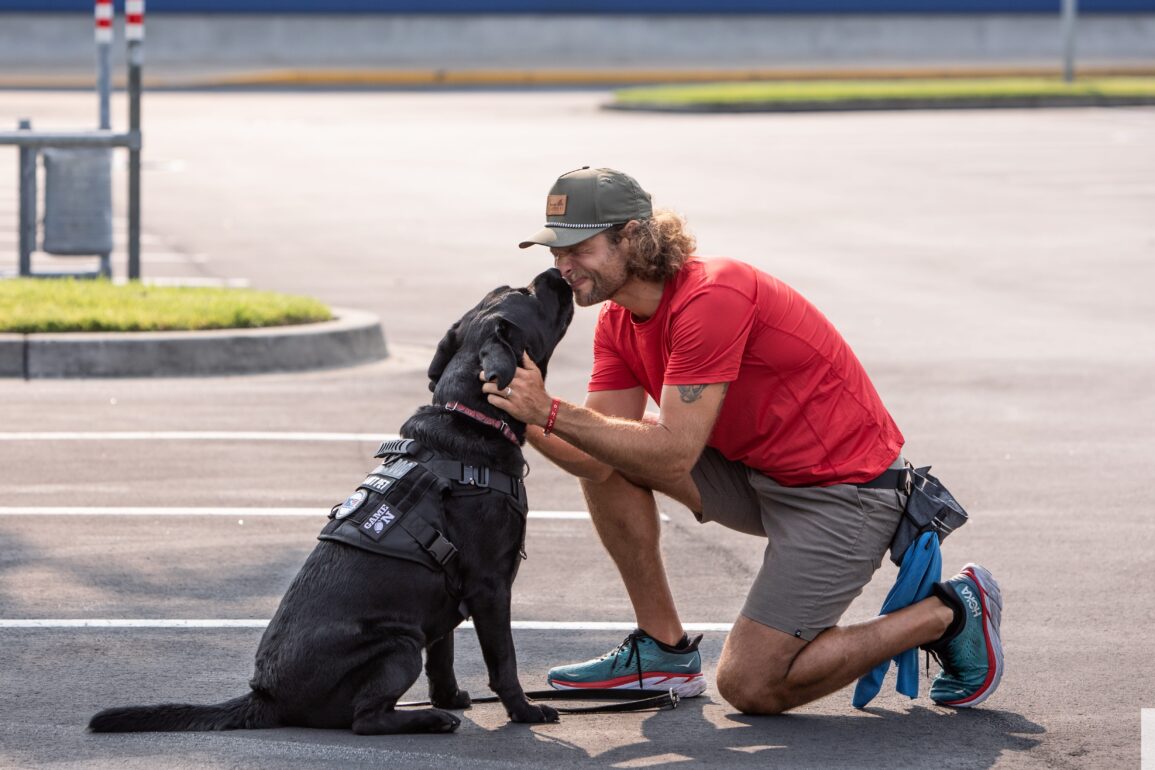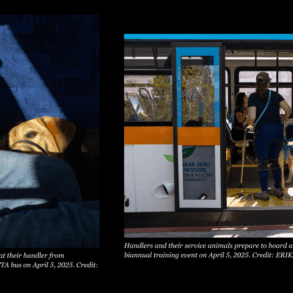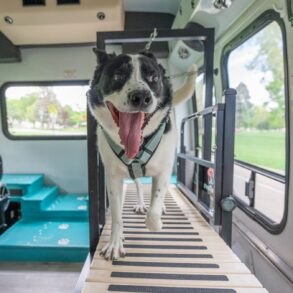
PTSD recovery made easier with help of service dog, says one veteran
Anthony Certa is a military veteran living with PTSD. He says his black English Labrador service dog helps his mental health in more ways than one.
- Untrained or poorly trained animals are misrepresented as service animals, creating issues for people with disabilities and businesses.
- Fake service dogs cause problems such as unsanitary behavior, biting incidents, and deterring customers, leading some businesses to ban all animals.
- While the ADA requires businesses to allow service animals, there’s no official national certification, and confusion exists about legitimate service animals.
Service dogs can be four-legged lifesavers, alerting to dangerous allergens, assisting with travel and making people with a wide range of disabilities safer.
But fake service dogs, advocates say, are taking a bite out of real service dogs’ credibility, exacerbating the challenges that people with disabilities who rely on service animals already face. Fake service dogs are poorly trained or untrained animals falsely passed off by individuals trying to access restrictedplaces or benefits.
Thousands of grocers and shop owners now prohibit any animals, including legitimate service dogs, from entering their stores. That’s because of incidents where fraudulent service animals have “urinated on expensive furnishings, contaminated food, bitten staff, and driven away paying customers,” according to Canine Companions for Independence, a nonprofit service dog organization headquartered in Santa Rosa, California.
About two-thirds of service dog users say the poorly trained or untrained dogs have negatively impacted their independence and quality of life, according to a 2022 survey conducted by Canine Companions.
“Service dog fraud and poorly trained service dogs pose a widespread and serious problem regardless of location and have a powerful negative impact on legitimate service dog teams,” the group said in a report.
Businesses are required to allow service animals onto their premises under Title III of the Americans with Disabilities Act (ADA), but it’s not always obvious whether a service dog is legitimate.
“It’s all about a dog’s behavior in public,” said John Bentzinger of Canine Companions. Business owners, he said, are also within their rights to ask dogs acting aggressively or inappropriately to leave.
However, service dogs aren’t required to complete a specific, national certification, according to the Department of Justice’s Civil Rights Division. People with disabilities have the right under federal law to train service dogs themselves to help with their unique needs, and some state and local laws do recognize “animals that are still in training,” according to the DOJ.
“There are individuals and organizations that sell service animal certification or registration documents online,” federal officials warn. “These documents do not convey any rights under the (Americans with Disabilities Act) and the Department of Justice does not recognize them as proof that the dog is a service animal.”
According to the DOJ, when it’s not obvious that the dog is a service animal, business owners can ask two questions, including whether the service animal is required because of a disability and what task or work the dog has been trained to perform. They cannot, however, demand documentation or ask that the dog demonstrate the task for which it has been trained.
Paul Mollica, a senior attorney with Equip for Equality, a Chicago-based protection and advocacy system for the state of Illinois, said that in many cases, the task is self-evident – for instance, a guide dog for the visually impaired. Other dogs may be trained to detect whether someone has low blood sugar or is about to experience a seizure, he said.
“There are dogs trained for when someone has PTSD to detect when a person is experiencing severe anxiety,” said Mollica, part of Equip for Equality’s anti-discrimination team. “That might sound like an emotional support animal, but it’s not – they actually put physical pressure on the person with their head or their paws, and it helps relieve the anxiety.”
The ADA Act National Network defines service dogs as those specially trained to perform tasks for people with physical, intellectual or mental disabilities. Such dogs are “more than just a vest,” according to Assistance Dogs International, explaining on its website that such dogs offer “expert training, crucial socialization and years of task-based independence to people with disabilities.”
Mollica advises individuals with service dogs who encounter skeptical business owners to take “a nonaggressive, non-defensive stance” and let them know the animal is legitimately needed.
“Be prepared to articulate what the dog is trained to do,” he said. “If it’s delivered in a way that’s understandable and sincere, that’s going to get you past a lot of problems.”
Service animals, Mollica said, perform needed functions just as white canes or oxygen tanks do.
“Service animals are on the same level,” he said. “They’re providing a vital service for people with disabilities, so excluding them is tantamount to telling a person with a white cane, ‘You can’t come in here.'”
However, people may struggle to acquire service animals: They can come at significant expense and aren’t necessarily covered by insurance.
For example, psychiatric service dog training can cost anywhere between $20,000 to $30,000 on average. Medicare and Medicaid do not cover service dogs, and most private insurances don’t either.
Fake service dogs undermine freedom and safety, advocates say
Nearly 93% of respondents to the Canine Companions survey said they had encountered “fake, questionable or uncontrolled service dogs,” while 79% reported uncontrolled dogs snapping at, biting, or interfering with their service dogs.
The survey was distributed to 60 organizations accredited by Assistance Dogs International throughout North America, Europe and Oceania. More than 1,500 service dog users responded, making the study of assistance-dog fraud the organization’s largest to date.
Even if a person with a disability hasn’t encountered one of the untrained or poorly trained animals in day-to-day life, it can still have a ripple effect. Skepticism about service dogs among business owners and others makes legitimate users less inclined to take service dogsout in public, the group said in its report.
“If a service dog user feels they will be denied access or that there are more poorly trained service dogs in public, they may opt to avoid public places with their service dog,” the organization said. “This ostensibly has an impact on the service dog user’s independence and quality of life if doors are being shut, figuratively, before service dog teams even leave their homes.”
According to NEADS World Class Service Dogs, based in Princeton, Massachusetts, properly trained service dogs can offer clients “life-changing emotional support and enable them to navigate the world more safely and confidently.”
NEADS, formerly known as National Education for Assistance Dog Services, agrees thatfraudulent service dogs are a growing problem in the United States. The Canine Companions survey, the group said in a 2023 statement, shows not only the frequency of fake service dog encounters but also demonstrates “how significantly they are undermining feelings of independence, quality of life and potentially even the safety of clients with legitimate service dogs.”
According to Canine Companions, loopholes in the ADA have enabled scammers to exploit the system. In 2024, the group said it hopes to persuade lawmakers to add definitive language to the act that addresses service dog representation, making it “crystal-clear that misrepresentation of a disability for personal gain – including the use of a service dog – is against the law.”
The group sought to gather 2,500 public signatures on an online petition calling for an end to service dog scams. As of April 13, a little more than 2,600 people had signed the document.
Not just service dog advocates
One of the latest local efforts on legitimate service dogs comes from Massachusetts state Rep. Kimberly Ferguson.
She proposed legislation on April 1that would create a 17-member commission to explore tougher regulation of service animals in the state.
If created, the commission would have until April 2026 to file a report assessing the prevalence of fraudulent service dogs statewide and whether prohibition or penalization of such fraud is necessary. It would also examine the feasibility of requiring service animals to be certified, registered, or licensed.
Massachusetts is one of 16 states without a “true ban” on fraudulent representation of pets as service animals, according to the Animal Legal and Historical Center at Michigan State University in East Lansing. A handful of those states still specifically prohibit misrepresentation of service animals in housing situations.
Contributing: Phaedra Trethan, Katie Camero(This story was updated with additional information.)
This post was originally published on this site be sure to check out more of their content.













































